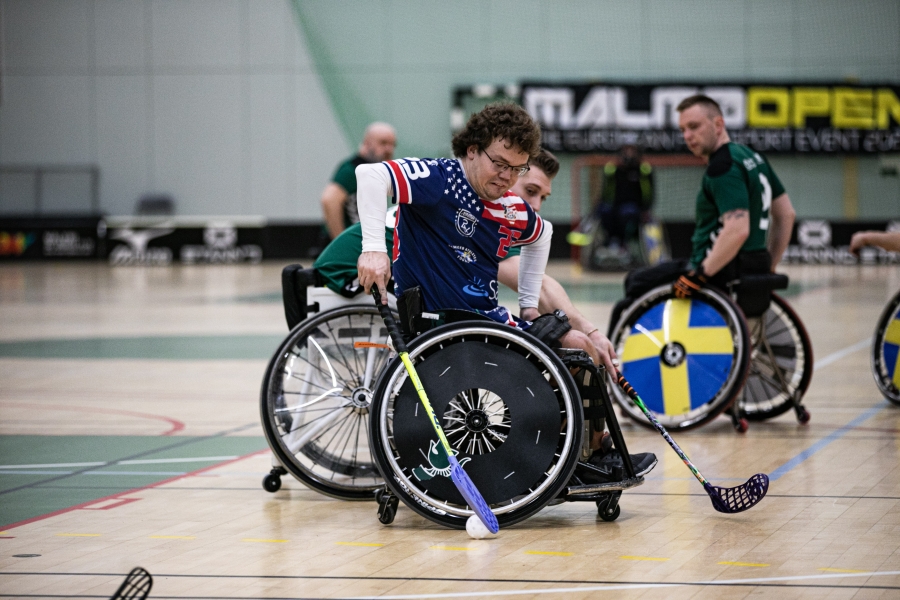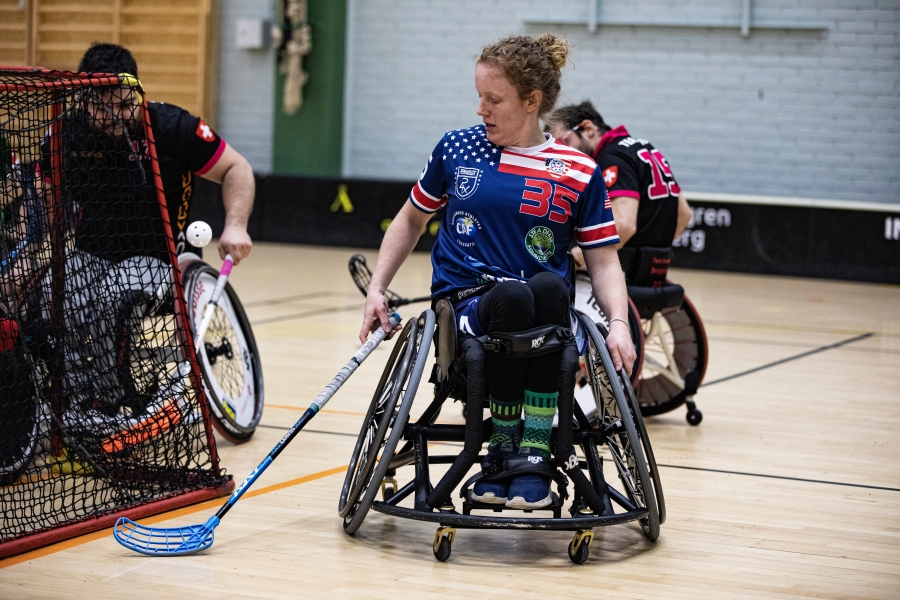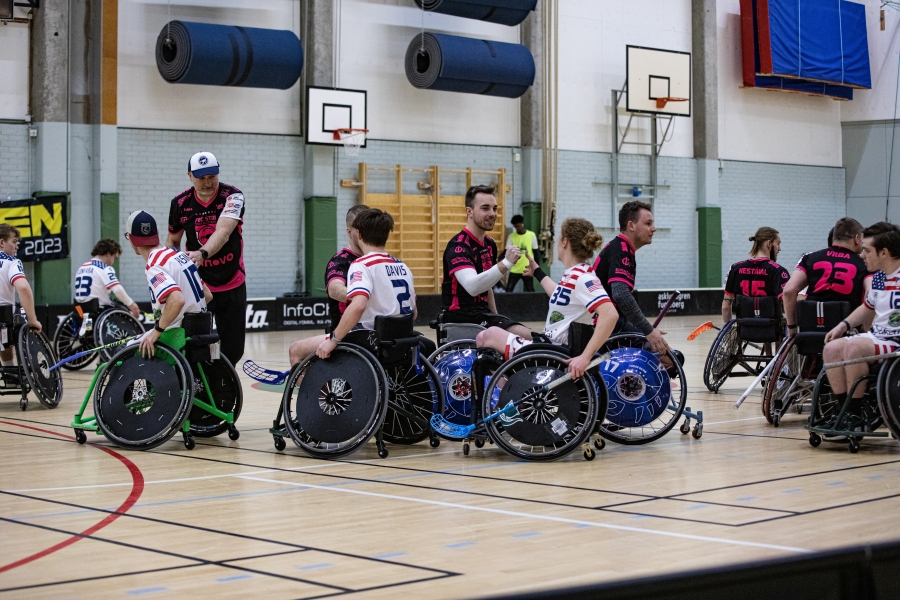In February, the MSU Adaptive Sports & Recreation Wheelchair Floorball Team competed in the 2023 Malmö Open Tournament at the European Parasports in Sweden. This team is no stranger to international competition, as this was their third time representing MSU and the USA in the Floorball Tournament. With each competition the team participates in, brings more experience, more comradery, and more opportunity, but perhaps the most important is that each competition brings more advancement toward Diversity, Equity, and Inclusion campus wide. MSU RCPD interviewed Piotr Pasik, Kinesiology Instructor and Director of the Adaptive Sports and Recreation Club who shared about the team’s experience at the Malmö Open.
Q: This is not the team’s first time competing in the parasport games. Can you share how many times you and the team have competed in events such as this?
A: The 2023 Malmö Open in Sweden was the 3rd time our Wheelchair Floorball (Hockey) team represented Michigan State University at an international competition. Specifically, on previous occasions we played at the 2019 Para Games Breda in Breda, Netherlands, as well as the 2022 Swiss Wheely Open in Nottwil, Switzerland (read more about the team’s 2022 competition here). We did not compete in 2020, or 2021, as international tournaments were cancelled due to the COVID-19 pandemic. Moreover, it is important to note here that in addition to representing MSU, our team was also sanctioned by the United States Floorball Association (USFbA), thus we were also representing the United States of America at these competitions.


Q: How did the team fare in the competition overall?
A: In terms of tournament results, it is important to provide a global context. In the world of Wheelchair Floorball (Hockey), we are a developing team. At present time, we are the only actively competing team not only in our state, but also, the United States, North America, and in fact, the Western Hemisphere. All of the other teams (Sweden, Czech Republic, Netherlands, Switzerland, and Belgium) are based in Europe, and all but Switzerland compete in domestic league seasons between international tournaments. Being the only team in the Western Hemisphere and given the sheer geographical size of the United States, makes our team reliant on students (this is in line with our long-term goal of having a wheelchair floorball team entirely comprised of MSU students with disabilities) and local players. Conversely, the teams we play against have the luxury of drawing from a talent pool that encompasses their entire country. Additionally, unlike other team wheelchair sports such as Wheelchair Basketball, or Wheelchair Rugby, which use a disability-based classification system to ensure fairness in competition along with more equitable access to the sport for individuals with more involved disabilities, the sport of Wheelchair Floorball (Hockey) and the International Floorball Federation only requires a "minimal handicap' that prevent a player from playing the able-bodied floorball. As a result of these factors, the starting rosters we face in competition are comprised of players most - if not all - of whom are significantly better than our best player. Moreover, as a recreational Wheelchair Sports program based on a college campus - first and foremost - we prioritize playing students with disabilities. Furthermore, as a developing program rooted in equity, we take an equitable approach when it comes to lineup selection. This ensures that we include players with a range of physical disabilities - including those with more involved disabilities - instead of simply relying on fielding players with "minimal handicaps" or able-bodied players (the International Floorball Federation permits a team to use up to 2 able-bodied field players at one time). This approach facilitates program stability until teams are able to field rosters that are entirely comprised of disabled players. Currently, Sweden, the Czech Republic, and the Netherlands field entirely disabled teams, while Switzerland, Belgium, and the United States utilize able-bodied players to different extent.
With all of that said, as far as tournament results are concerned, we lost all 6 of our matches. However, our team positioning and tactical approach improved with every match, as we reorganized our team roles. This collective approach allowed us to capitalize on individual strengths within the context of the team. As we settled into our respective roles, we played with more comfort on the ball, which allowed us to play more offensively. As a result, we scored more goals in Sweden (8), than our previous 2 tournaments combined (7). More importantly, our transition game from defense to offense never looked better, a very promising sign for the future, and something that I am extremely proud of. These tactical improvements are a result of a collective commitment to the team, as well as coaching we have received from student volunteers enrolled in an independent study with our program, as well as student interns completing their internship requirement with us.
Q: What does this experience mean for you/the team?
A: More than anything - to me - this experience is a representation of the significant strides that we have taken toward advancing Diversity, Equity, and Inclusion when it comes to disability on campus. Today, a freshman with a physical disability has an opportunity to represent their country, and their university in an athletic competition on a global scale, much like their able-bodied peers. Experiences that were not afforded to Spartans with physical disabilities when I was an undergraduate student at MSU. Establishing the opportunity to compete on an international stage annually also serves as validation of the incredible amount of effort that my teammates have put in at our daily Adaptive Sports sessions since 2014 (18,607 hours of adapted physical activity), along with the immense amount of time that our volunteers have selflessly committed to our program in the last 9 years (35,772 volunteer hours), during the steadily increasing inclusive opportunities we offer that now feature 5 2-hour Adaptive Recreation/Wheelchair Sports sessions each week, year-round (to date, this encompasses 3,006.5 total hours of inclusive programming). Moreover, our ability to successfully create and sustain an unprecedented global experience for Spartans with physical disabilities is a direct result of positive cross campus synergy and illustrates what is possible when individual departments work together toward a common institutional goal of advancing Diversity, Equity, and Inclusion at MSU. As a collective, we are always greater than the sum of our individual parts.
Although tournament play lasted 3 days, this opportunity to represent our university and our country on the international stage took 3,081 days to build up to. This global experience has been built on the backs of 1,457 individuals - with and without disabilities - who have participated in the MSU Adaptive Sports & Recreation Club in a range of capacities, (athletes, volunteers, interns, academic project personnel). Our capacity to provide competitive opportunities abroad annually was not established overnight. It is the result of longstanding partnerships that are rooted in an ongoing commitment to advancing Diversity, Equity, and Inclusion at MSU. The list of collaborating stakeholders includes:
- MSU College of Engineering
- MSU Department of Intercollegiate Athletics
- MSU Department of Kinesiology
- MSU Department of Police & Public Safety
- MSU Office for Institutional Diversity & Inclusion
- MSU Recreational Sports & Fitness Services
- MSU Resource Center for Persons with Disabilities
- MSU Student Life & Engagement
- MSU University Licensing Programs
- Dean Transportation
- Domino’s Pizza
- Fusion Medical
- MSU Federal Credit Union
- Per4Max Wheelchairs
- Challenged Athletes Foundation
- Christopher & Dana Reeve Foundation
- Craig H. Neilsen Foundation
- Michigan Health Endowment Fund
- Steadfast Foundation
- Eastern Michigan University
- Grand Valley State University
- University of Michigan
- The United States Floorball Association
- The United States Tennis Association

Q: Does the team plan to attend next year’s competition?
A: The Malmö Open Wheelchair Floorball Tournament in Sweden is only held once every 2 years. Thus, next year (in April), we will compete in the 2024 Swiss Wheely Open Wheelchair Floorball Tournament in Nottwil, Switzerland.
What an amazing opportunity for this Wheelchair Floorball team and future Wheelchair Floorball teams to come! Team RCPD looks forward to following the next competition in 2024!
The MSU Adaptive Sports & Recreation Club relies on donors and community support for funding. If you would like to contribute to this program, please click here and search, "Kinesiology - Adaptive Sports & Rec Club Fund."